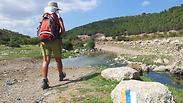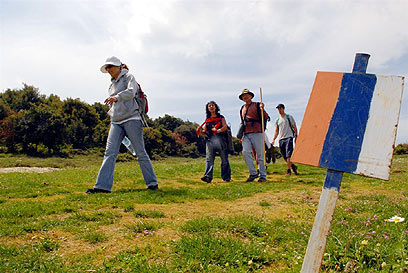
It could be any dinner table in any house in Israel, but the unique thing was that Moss had met her dinner guests for the first time just 10 minutes earlier. Moss, a therapist, and her tour-guide husband Allan Rabinowitz, are "trail angels" – citizens who open their homes to the growing number of people who set out to walk the Israel Trail, all 620-miles of it, running from Eilat on the Red Sea in the south to the Lebanese border in the north.
"At first we were going to sleep in a youth hostel in the Old City (of Jerusalem) but it was full," Guy Kahalani, 23, told The Media Line. "So we decided to call and see if they had room here. We see being able to stay here as a real bonus to our experience."
The four hikers have been together for a month, and plan to be on the trail for another six weeks. They met up through one of the hikers, Eyal Kedar, three of them having just finished their compulsory army service.
"It’s a way to discover the country with my feet," Danielle Telman, 22, a pretty young woman with long brown hair and a nose stud told The Media Line. "This country is so small but there’s so much to see. When I meet these trail angels it makes me believe in the good in people and makes me ask myself if I am really doing enough to help people."
The Israel Trail, inspired by America’s Appalachian Trail, was inaugurated in 1995. Since then, tens of thousands of Israelis have hiked at least part of it. According to a 2010 survey, about four out of 10 finish the entire hike, usually taking between six weeks and two months to do so.
Hiking is seen as a way of deepening identification with the land of Israel. Children often begin overnight hikes even in elementary school, and scouting groups offer longer hikes during school vacations and in the summer.
For Israelis, The Israel Trail has become part of popular culture. Iconic author David Grossman himself hiked the trail, using it as inspiration for his book, "To the End of the Land," about a woman who flees to the Israel Trail to escape possible bad news about her son in the army. Tragically, Grossman’s own son was killed in Lebanon while he was writing the book.
The trail is marked with orange, white and blue markers and crosses vistas ranging from the desert to mountains. Most of the trail runs far from Israeli towns and cities, although they do occasionally intersect.
The hardest part of the trail, the hikers agree, is the section from Eilat to Arad which crosses the desert. Kedar says they drove along the trail before they set out, burying water along the way. They each also carried a gallon and a half of water with them, although have now cut that amount in half as there are more places to refill their water supply.
In the desert, they slept mainly outside. But now, they are happy to accept the hospitality of the trail angels, several hundred of whom are listed on a website, along with what services they are willing to provide. Some offer just a backyard lawn where hikers can pitch a tent, but most offer showers and kitchen facilities. A few, like Moss and Rabinowitz, offer meals to the hikers.
"I try to provide dinner if I can," Moss told The Media Line. "I know that it is those little special things that can really make a difference."
'I've fallen back in love with the country'
Moss and Rabinowitz should know. In 2009, they, along with their son Ezra, then in 12th grade, did the same hike their guests are now doing. It was soon after Rabinowitz’s mother had died of ALS, also known as Lou Gehrig’s disease. They asked friends and family to sponsor their hike, and raised almost $40,000 for ALS research.
"People who hosted us were so amazing," Rabinowitz, who was 55 when he did the hike, says. "Total strangers invited us for meals, or to spend the Jewish Sabbath with them. After that experience we knew we needed to be part of it."
Moss says they ask the hikers to get in touch two days in advance so they can prepare. The hikers can sleep in one of two places – either a converted storage room that doesn’t have its own bathroom, or in Rabinowitz’s office which is one of the three bedrooms of their apartment. They also offer them showers, and use of their computers.
She does sometimes say no to prospective guests, she says, if the timing is not convenient or if her son is coming home from the army for a break. Over the past four years she has hosted hundreds of hikers and her experience has been mostly positive.
"There were a few who came and didn’t really talk to us and basically used the place as a hotel," she said. "But the vast majority is lovely young people like these, and it’s a real pleasure to meet them."
For their part, the hikers seem grateful for the home-cooked meal and a real bed.
"It’s really heartwarming," Asher Wertheim, 23, told The Media Line.
Kahalani, who is taking a break from his university studies in philosophy, said that he heard about the trail while traveling in New Zealand.
"I have been pleasantly surprised by the whole experience," he said. "We get to places that a lot of tourists never get to."
The hikers said that they encouraged each other on difficult days. For solitary hikers, loneliness can be difficult. Moss said she sometimes used her background as a therapist to encourage the hikers.
"We had two girls who started in the north and were heading to the south and they were afraid of the part where you have to go through the desert," she said. "They were thinking of quitting. I encouraged them to continue and a few weeks later got a text from them saying, 'We made it to Eilat!' That was a very good feeling."
After dinner, the hikers sat in the living room to chat. When Rabinowitz arrived home after a long day of guiding, he took out his guitar. Kedar, who plays in a band with Wertheim, took out his guitar that he has been carrying on his back for the past month, and the two began playing American rock songs.
"You really carried your guitar the whole way – you’re crazy," said Moss with a laugh.
"I couldn’t imagine not playing for two months," Kedar replied. "I decided I could do without a tent, but not without my guitar."
Only Wertheim actually brought a tent, and he planned to leave it behind for other hikers doing the route the opposite way. In fact, hikers often leave food and clothing for each other.
Moss said she feels she has gained even more than she has given from her experience, first as a hiker, then as a trail angel.
"I’ve fallen back in love with the country in a big way," she said.
Article written by Linda Gradstein.
Reprinted with permission from The Media Line .
















